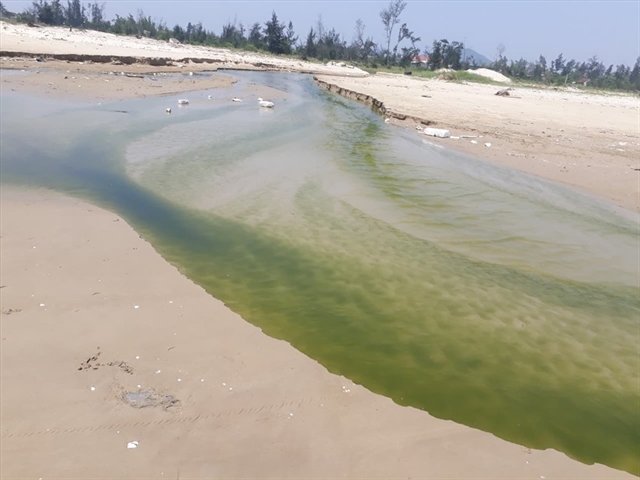 Society
Society


|
| A stream of waste water from shrimp breeding ponds found on the beach in Kỳ Phú Commune in Hà Tĩnh Province. Photo laodong.vn |
HÀ TĨNH — Residents in the central province of Hà Tĩnh previously complained that waste from shrimp breeding ponds is causing pollution, but local authorities have yet to find a solution for the problem.
Shrimp ponds in the province’s Kỳ Phú Commune in Kỳ Anh District have released their waste water directly into the environment for years, locals reported. Waste water from 3ha of shrimp ponds polluted the nearby beach and almost all lowland areas around the ponds.
Nguyễn Lợi, a resident, told a local newspaper that the large volume of waste water released every day causes an awful smell. The beach is also polluted, he added.
Đăng Cơ, another resident, said 50 families in the commune have endured the pollution for five years.
Residents said they reported the pollution problem to local authorities, but they have yet to see any changes.
The ponds were approved by provincial authorities for a period of 20 years for the production of 60 tonnes of shrimp a year, starting in 2012. No waste plan was included in the 6ha breeding ponds.
The commune chairman said reports by locals have been transferred to provincial authorities as the commune did not have the authority to deal with the polluters. Meanwhile, the division of natural resources and environment in the district denied this, saying it has yet to fix the issue as no reports have been made.
Pollution also occurred in Thạch Hà District, which has 200ha of shrimp breeding ponds and in Cẩm Xuyên District, with 119ha in total. Estimation by an expert showed an average of one tonne of solid waste and thousands of cubic metres of waste water is released from one hectare of shrimp pond.
The solid waste includes bottles, veterinary chemical containers, and fabric used for cleaning. Waste water from the shrimp pond contains the chemicals as well as waste feed and biological waste.
Đặng Thị Thu Hoàn, deputy director of local Department of Breeding and Veterinary, said once a large area contains shrimp breeding ponds, it needs a central waste water muster area that has canals connecting to the ponds to collect water for treatment.
Plans for waste water treatment must be added to the investment profile for approval, she added. — VNS